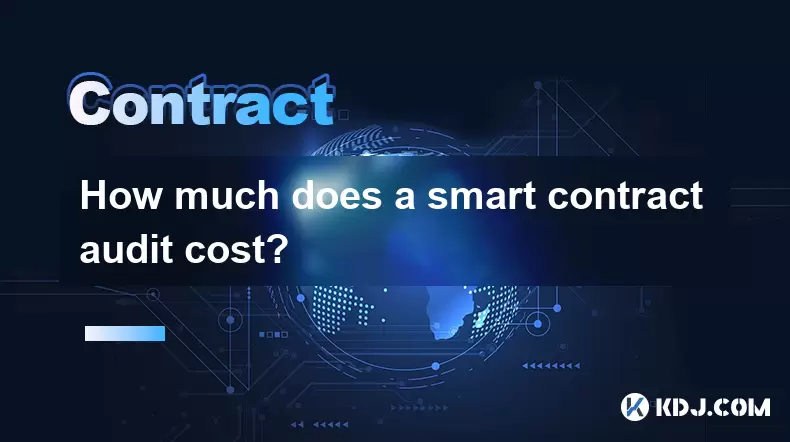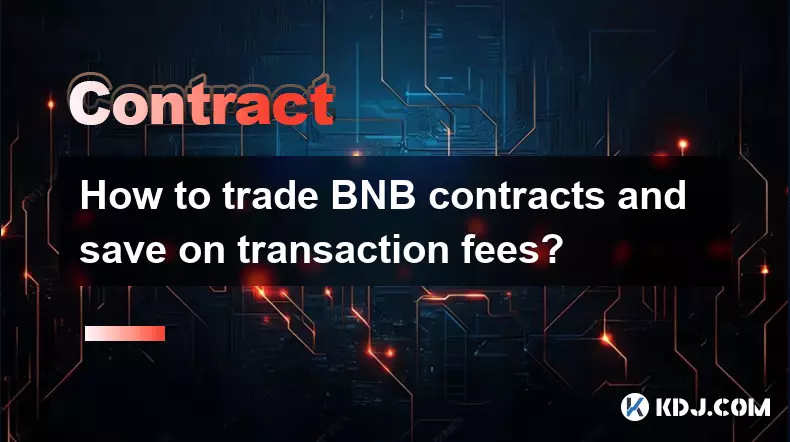-
 bitcoin
bitcoin $87959.907984 USD
1.34% -
 ethereum
ethereum $2920.497338 USD
3.04% -
 tether
tether $0.999775 USD
0.00% -
 xrp
xrp $2.237324 USD
8.12% -
 bnb
bnb $860.243768 USD
0.90% -
 solana
solana $138.089498 USD
5.43% -
 usd-coin
usd-coin $0.999807 USD
0.01% -
 tron
tron $0.272801 USD
-1.53% -
 dogecoin
dogecoin $0.150904 USD
2.96% -
 cardano
cardano $0.421635 USD
1.97% -
 hyperliquid
hyperliquid $32.152445 USD
2.23% -
 bitcoin-cash
bitcoin-cash $533.301069 USD
-1.94% -
 chainlink
chainlink $12.953417 USD
2.68% -
 unus-sed-leo
unus-sed-leo $9.535951 USD
0.73% -
 zcash
zcash $521.483386 USD
-2.87%
How much does a smart contract audit cost?
A smart contract audit is a critical security review that identifies vulnerabilities in blockchain code, with costs ranging from $2,000 to over $100,000 based on complexity and provider.
Aug 12, 2025 at 09:14 pm

What Is a Smart Contract Audit?
A smart contract audit is a comprehensive review of the code that governs a blockchain-based application, typically built on platforms like Ethereum, Binance Smart Chain, or Solana. The primary goal is to identify vulnerabilities, logic errors, and potential attack vectors before deployment. These audits are conducted by specialized cybersecurity firms or blockchain developers with expertise in secure coding practices. A properly audited contract helps ensure that funds, data, and user interactions are protected from exploits such as reentrancy attacks, integer overflows, or unauthorized access. The process includes static analysis, dynamic testing, manual code review, and sometimes formal verification. The complexity of the contract directly influences the time and expertise required, which in turn affects the total audit cost.
Factors That Influence Smart Contract Audit Pricing
The cost of auditing a smart contract is not standardized and can vary significantly based on several key factors:
- Code complexity: Contracts with multiple functions, intricate logic, or integration with other protocols require more time to analyze. For example, a simple token contract may cost less than a decentralized exchange or lending platform.
- Number of lines of code (SLOC): Larger codebases naturally demand more effort. A project with over 1,000 lines of Solidity may require days of review compared to a few hours for smaller contracts.
- Blockchain platform: While Ethereum is the most common, audits for Solana, Polkadot, or Layer 2 solutions like Arbitrum may involve different tools and expertise, affecting pricing.
- Audit firm reputation: Well-known firms such as CertiK, Hacken, or OpenZeppelin often charge premium rates due to their track record and thoroughness.
- Audit depth: A basic review may only cover common vulnerabilities, while a full audit includes gas optimization, design flaws, and custom attack scenarios.
- Urgency: Expedited audits with tight deadlines usually incur rush fees, sometimes doubling the base price.
These variables make it essential to request detailed quotes based on your specific project scope.
Typical Cost Ranges for Smart Contract Audits
Smart contract audit pricing can range from a few hundred to tens of thousands of dollars depending on the project: - Small projects (e.g., ERC-20 tokens, basic NFT contracts): These typically cost between $2,000 and $5,000. They involve straightforward logic and minimal interaction with external contracts.
- Medium complexity (e.g., staking platforms, yield aggregators): These audits usually fall in the $5,000 to $15,000 range. Multiple functions, access controls, and integration with oracles or DeFi protocols increase the workload.
- High complexity (e.g., decentralized exchanges, lending protocols, cross-chain bridges): These can cost $15,000 to $50,000 or more. Such systems involve complex state management, flash loans, price oracles, and extensive security considerations.
- Enterprise or institutional-grade audits: For large-scale financial protocols or government-backed blockchain initiatives, audits may exceed $100,000, especially when involving formal verification or multi-phase reviews.
It’s important to note that some firms offer tiered packages, including post-audit support, re-audits after fixes, and public certification.
Step-by-Step Process of Obtaining an Audit
To get a smart contract audit, follow these steps: - Prepare your code: Ensure your Solidity or Rust code is well-documented, uses consistent formatting, and includes comments explaining complex logic. Provide a detailed technical specification outlining the contract’s purpose and expected behavior.
- Select an audit provider: Research firms with proven experience in your blockchain ecosystem. Check their past audit reports, client testimonials, and response times.
- Submit a request for quote (RFQ): Share your code repository (often via GitHub), technical docs, and any specific concerns. Some firms require non-disclosure agreements (NDAs) before proceeding.
- Receive and compare quotes: Evaluate pricing, estimated timeline, and scope of work. Confirm whether the quote includes remediation reviews or only a one-time report.
- Begin the audit: The firm will perform static analysis using tools like Slither or MythX, conduct manual reviews, and test edge cases. You may be asked to clarify design decisions during the process.
- Receive the audit report: This document will list critical, high, medium, and low-severity findings, along with remediation suggestions. Address all critical issues before deployment.
- Request a re-audit (if needed): Some firms offer free or discounted re-audits after you fix the reported vulnerabilities, ensuring all issues are resolved.
Hidden Costs and Additional Services
Beyond the base audit fee, several additional costs may arise: - Post-audit remediation support: Some firms charge extra for consulting on how to fix complex vulnerabilities.
- Continuous monitoring: Services like CertiK’s Skynet offer ongoing surveillance for deployed contracts, typically billed monthly.
- Public certification badges: Displaying a verified audit seal on your website or marketing materials may require a licensing fee.
- Gas optimization reports: While not part of standard audits, some providers offer separate analysis to reduce transaction costs, which can be valuable for user experience.
- Integration with security tools: Connecting your project to platforms like Forta or Tenderly for real-time alerts may involve setup fees or subscriptions.
These extras can add $1,000 to $10,000+ to the total expense, depending on the services selected.
How to Reduce Audit Costs Without Compromising Security
While cutting corners on security is dangerous, there are legitimate ways to manage expenses: - Modularize your code: Break large contracts into smaller, reusable components. This simplifies review and may reduce audit scope.
- Use audited libraries: Leverage well-tested open-source components like OpenZeppelin Contracts, which have already been vetted by the community.
- Conduct internal reviews first: Run automated tools like Solhint or Prettier to catch basic issues before involving a third party.
- Choose mid-tier firms with strong reputations: Not all high-quality auditors charge premium prices. Look for firms with transparent methodologies and published reports.
- Plan ahead: Avoid rush fees by scheduling audits well before launch dates.
Frequently Asked Questions
Can I audit my own smart contract? While developers can perform self-audits using tools like Slither, Mythril, or Hardhat’s testing suite, these methods lack the depth of a professional review. Automated tools miss logical flaws and design vulnerabilities. A third-party audit provides an objective, expert perspective essential for user trust and security.Do audit firms provide insurance or liability coverage?Some audit companies partner with insurers to offer bug bounty programs or limited financial coverage if a vulnerability is missed. However, most disclaim full liability. The audit report is a security assessment, not a guarantee against exploits.
How long does a smart contract audit take?Timelines vary: small audits may take 3 to 5 business days, while complex projects can require 2 to 4 weeks. Expedited services might deliver results in 48 hours, but thoroughness may be compromised.
Are open-source audit reports mandatory?No, but publishing the report builds community trust. Some investors and exchanges require public audit documentation before listing or funding. Firms can provide redacted versions if sensitive logic must remain confidential.
Disclaimer:info@kdj.com
The information provided is not trading advice. kdj.com does not assume any responsibility for any investments made based on the information provided in this article. Cryptocurrencies are highly volatile and it is highly recommended that you invest with caution after thorough research!
If you believe that the content used on this website infringes your copyright, please contact us immediately (info@kdj.com) and we will delete it promptly.
- BlockDAG's $452M Presale Nears End: The $0.0005 Upside Entry Opportunity for 2026
- 2026-02-03 15:40:02
- IronWallet Revolutionizes Crypto: Multi-chain Wallet, Gasless Transactions, and Privacy-First Security Take Center Stage
- 2026-02-03 15:55:01
- The Epstein Files & Satoshi's Shadow: Emails Exposed, Crypto's Past Reimagined
- 2026-02-03 12:35:01
- BlockDAG's $450M+ Presale Countdown: The 100x Opportunity About to Vanish
- 2026-02-03 12:50:01
- Bitcoin Price Plummets Below Key Thresholds Amid Market Shift: What Investors Need to Know
- 2026-02-03 13:20:01
- SpaceCoin Unveils 10% APR Staking Program, Pioneering Decentralized Satellite Internet
- 2026-02-03 13:20:01
Related knowledge

How to close a crypto contract position manually or automatically?
Feb 01,2026 at 11:19pm
Manual Position Closure Process1. Log into the trading platform where the contract is active and navigate to the 'Positions' or 'Open Orders' tab. 2. ...

How to understand the impact of Bitcoin ETFs on crypto contracts?
Feb 01,2026 at 04:19pm
Bitcoin ETFs and Market Liquidity1. Bitcoin ETFs introduce institutional capital directly into the spot market, increasing order book depth and reduci...

How to trade DeFi contracts during the current liquidity surge?
Feb 01,2026 at 07:00am
Understanding Liquidity Dynamics in DeFi Protocols1. Liquidity surges in DeFi are often triggered by coordinated capital inflows from yield farming in...

How to use social trading to copy crypto contract experts?
Feb 02,2026 at 07:40am
Understanding Social Trading Platforms1. Social trading platforms integrate real-time market data with user interaction features, enabling traders to ...

How to trade BNB contracts and save on transaction fees?
Feb 03,2026 at 12:39am
Understanding BNB Contract Trading Mechanics1. BNB contracts are derivative instruments traded on Binance Futures, allowing users to gain leveraged ex...

How to build a consistent crypto contract trading plan for 2026?
Feb 02,2026 at 10:59pm
Defining Contract Specifications1. Selecting the underlying asset requires evaluating liquidity depth, historical volatility, and exchange support acr...

How to close a crypto contract position manually or automatically?
Feb 01,2026 at 11:19pm
Manual Position Closure Process1. Log into the trading platform where the contract is active and navigate to the 'Positions' or 'Open Orders' tab. 2. ...

How to understand the impact of Bitcoin ETFs on crypto contracts?
Feb 01,2026 at 04:19pm
Bitcoin ETFs and Market Liquidity1. Bitcoin ETFs introduce institutional capital directly into the spot market, increasing order book depth and reduci...

How to trade DeFi contracts during the current liquidity surge?
Feb 01,2026 at 07:00am
Understanding Liquidity Dynamics in DeFi Protocols1. Liquidity surges in DeFi are often triggered by coordinated capital inflows from yield farming in...

How to use social trading to copy crypto contract experts?
Feb 02,2026 at 07:40am
Understanding Social Trading Platforms1. Social trading platforms integrate real-time market data with user interaction features, enabling traders to ...

How to trade BNB contracts and save on transaction fees?
Feb 03,2026 at 12:39am
Understanding BNB Contract Trading Mechanics1. BNB contracts are derivative instruments traded on Binance Futures, allowing users to gain leveraged ex...

How to build a consistent crypto contract trading plan for 2026?
Feb 02,2026 at 10:59pm
Defining Contract Specifications1. Selecting the underlying asset requires evaluating liquidity depth, historical volatility, and exchange support acr...
See all articles

























![Discontinuum by: ArchitechGD 100% (1 coin) (Mobile) Geometry Dash [2.2] Discontinuum by: ArchitechGD 100% (1 coin) (Mobile) Geometry Dash [2.2]](/uploads/2026/02/03/cryptocurrencies-news/videos/origin_69814d99e6b61_image_500_375.webp)
















































